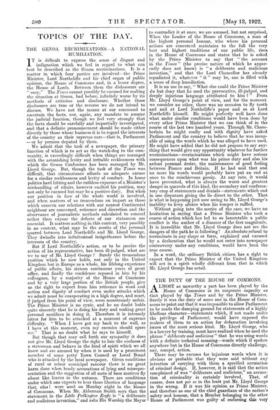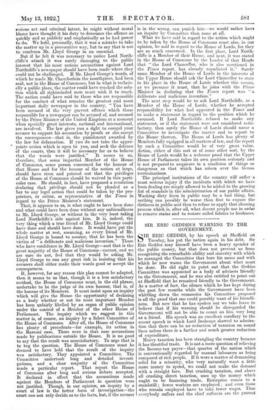THE DUTY OF THE HOUSE OF COMMONS. A LMOST as unworthy
a part has been played by the House of Commons in its corporate capacity as that played by the Times and by the Prime Minister. Surely it was the duty of some one in the House of Com- mons to point out that it was impossible to allow Parliament to be made the dumping ground for statements of a highly libellous character—statements which, if not made under the privilege of Parliament, would have exposed the makers of them to an action for defamation involving issues of the most serious kind. Mr. Lloyd George, who is a lawyer by training, must have realized when he used the phrase " deliberate and malicious " that he was using words with a definite technical meaning—words which if spoken anywhere but in the House of Commons directly challenge, nay, compel, action. There may be excuses for injurious words when it is obvious or probable that they were said without any intention of carrying with them a specified accusation of criminal design. If, however, it is said that the action complained of was " deliberate and malicious," an accusa- tion of criminality is certainly involved. That, of course, does not per se in the least put Mr. Lloyd George in the wrong. If it was his opinion as Prime Minister, and therefore as one of the chief guardians of the nation's safety and honour, that a Member belonging to the other House of Parliament was guilty of endorsing this very serious act and criminal intent, he might without moral blame have thought it his duty to denounce the offence as quickly and as publicly and emphatically as he had power to do. We hold, personally, that it was a mistake to take the matter up in a provocative way, but to say that is not to condemn- Mr. Lloyd George in an essential. But if he felt it was necessary to notice Lord North- cliffe's attack it was surely damaging to the public interest that his most serious accusations against Lord Northcliffe's newspaper should have been made where they could not be challenged. If Mr. Lloyd George's words, of which he made Mr. Chamberlain the mouthpiece, had been said, not in the House of Commons, but in what is technic- ally a public place, the matter could have reached the solu- tion which all rightminded men must wish it to reach. The nation could have said to those who are responsible for the conduct of what remains the greatest and most important daily newspaper in the country, " You have been accused of the very gravest offence which those responsible for a newspaper can be accused of, and accused by the Prime Minister of the United Kingdom at a moment when specially great interests, national and international, are involved. The law gives you a right to compel your accuser to support his accusation by proofs or else accept the consequences—that is, the punishment awarded by the law for defamation. If you do not take the appro- priate action which is open to you, and seek the defence of the courts, then it will be necessary for us to believe that the words were justified." It seems to us, therefore, that some impartial Member of the House of Commons, some person concerned for the honour of that House and for the honour of the nation at large, should have risen and pointed out that the privileges of the House of Commons should be waived in this parti- cular case. He should, in fact, have proposed a resolution declaring that privilege should not be pleaded as a bar to any legal action that could be taken by the pro- prietors, or editor, or representative of the Times in regard to the Prime Minister's statement. That, it appears to us, is what ought to have been done and what could have been done without any unfriendliness to Mr. Lloyd George, or without in the very least taking Lord Northcliffe's side against him. It is, indeed, the very thing which a true friend of Mr. Lloyd George could have done and should have done. It would have put the whole matter at rest, assuming, as every friend of Mr. Lloyd George is bound to assume, that he has been the victim of " a deliberate and malicious invention." Those who have confidence in Mr. Lloyd George—and that is the great majority of the House of Commons—cannot, and we are sure do not, feel that they would be asking Mr. Lloyd George to run any great risk in insisting that his accusers shall either make their words good or accept the consequences. If, however, for any reason this plan cannot be adopted, then it seems to us that, though it is a less satisfactory method, the House of Commons must, in the old phrase, undertake to be the judge of its own honour, that is, of the honour of its Members. It must insist upon an inquiry which will give the House the opportunity of declaring as a body whether or not its most important Member has been unfairly libelled by an organ of public opinion under the control of a Member of the other House of Parliament. The inquiry which we suggest in this matter is, of course, an inquiry by a Select Committee of the House of Commons. After all, the House of Commons has plenty of precedents—for example, its action in the Marconi case. There were in that case accusations made by publications outside the House. It is no good to say that the result was unsatisfactory. To urge that is to beg the question. The House of Commons must be deemed to have held that the result of the inquiry was satisfactory. They appointed a Committee. The Committee undertook long and detailed investi- gations, and a clear majority of the Committee made a particular report. That report the House of Commons after long and serious debate accepted. It declared in effect that the accusations made against the Members of Parliament in question were not justified. Though, in our opinion, an inquiry by a court of law is the better form of investigation—the court can not only decide as to the facts, but, if the accuser is in the wrong, can punish him—we would rather have an inquiry by Committee than none at all.
What we have said in regard to the action which ought to be taken by the House of Commons must also, in our opinion, be said in regard to the House of Lords, for they are as much concerned. In the first place, Lord North- cliffe is a Member of their House, and next, it was stated in the House of Commons by the Leader of that House that " the Lord Chancellor, who is also mentioned in the Times report, has already repudiated it." Surely some Member of the House of Lords in the interests of the Upper House should ask the Lord Chancellor to state in his place in the House of Lords whether this means, as we presume it must, that he joins with the Prime Minister in declaring that the Times report was " a deliberate and malicious invention."
The next step would be to ask Lord Northcliffe, as a Member of the House of Lords, whether he accepted responsibility for what had appeared in the Times and to make a statement in regard to the position which he assumed. If Lord Northcliffe refused to make any statement, or if the statement were not considered satis- factory, then surely the House of Lords should name a Committee to investigate the matter and to report to the House thereon. The House of Lords has plenty of Members fully equipped in all matters of law, and the report by such a Committee would be of very great value. Action, either of this sort or of some other sort, by the House of Lords would be a welcome proof that the Upper House of Parliament takes its own position seriously and is not prepared to acquiesce in a condition of things so dangerous as that which has arisen over the Genoa recriminations.
The principal institutions of the country will suffer a most serious injury if the incidents with which we have been dealing are simply allowed to be added to the growing list of scandals in the administration of our public affairs. Washing dirty linen in public may be a bad thing, but nothing can possibly be worse than first to expose the dirtiness in public and then to refuse to apply that cleaning process which is, after all, what decent people use in order to remove stains and to restore soiled fabrics to freshness.



































 Previous page
Previous page